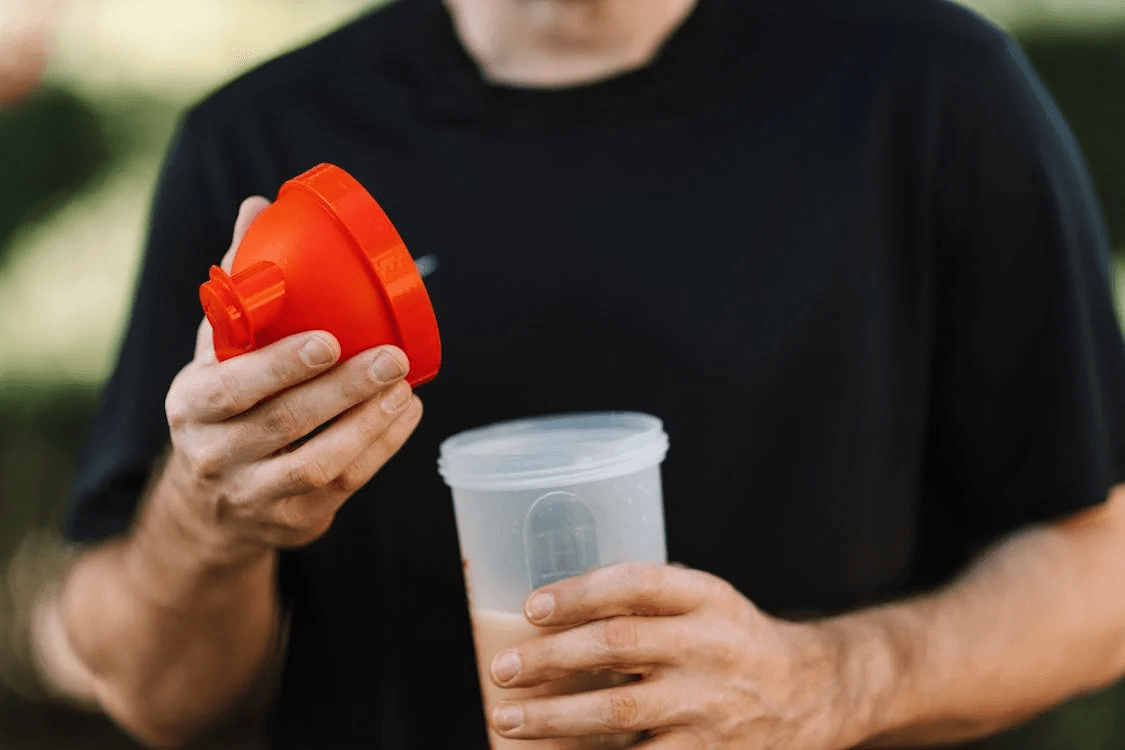Building muscle, also known as hypertrophy, requires more than just hitting the gym - what you eat, particularly your protein intake, plays a big role too, as protein is essential for building and rebuilding muscle. However, you're probably wondering, how much protein should I eat to gain muscle?, and if so, you're not alone. Many people struggle to find that sweet spot between eating too little and overdoing it.
In this article, we'll explore how much protein per day you need to build muscle, why it matters, and give you easy-to-follow tips on how to calculate your protein needs. Keep reading to make sure you're giving those muscles the fuel they need!
Why is protein important for muscle growth?
Protein has multiple roles in the body. While regular exercise, particularly resistance training, is crucial for gaining muscle, you also need enough protein to repair and grow the muscle fibres you're breaking down during workouts.
When you consume protein, it's broken down into amino acids - the key to muscle repair and growth. This process, known as muscle protein synthesis, is vital for muscle recovery. Without enough protein in your diet, your body won't have the resources to rebuild and grow those muscles effectively.(1)
But it's not just muscles that need protein. It also plays a vital role in your immune function, hormone production, and even skin health. So, even if you're not chasing those gains, getting enough protein is essential for overall well-being.
"As a nutritional therapist, I often tell clients that protein isn't just for bodybuilders. It's essential for everyone. While athletes need more, protein also supports your metabolism, helps with recovery from injury, and keeps your immune system functioning well." Kerry Beeson BSc (Nut. Med). Nutritional Therapist
However, if you do want to build muscle, then protein will be an important part of your diet. Studies have shown that consuming enough protein alongside resistance training significantly improves muscle mass and strength.(2) Protein intake also supports other bodily functions such as tissue repair and immune response. (3)
How much protein do you need on a normal diet?
For the average person who's not hitting the gym regularly or aiming to bulk up, the recommended protein intake is around 0.8 grams per kilogram of body weight. So, if you weigh 70kg, you'd need about 56g of protein per day. This amount supports general bodily functions and helps maintain lean body mass.(4)
For more details on your specific needs, check out our article on How Much Protein Do I Need?
How much protein should you eat to gain muscle?
When you're aiming to build muscle, your daily protein requirements increase. In order to gain muscle, you need to eat more protein than is broken down naturally during training, known as net positive nitrogen balance. A negative nitrogen balance is called catabolism, when not enough protein is consumed to offset this process.
Research shows that consuming between 1.6 -- 2.2 grams of protein per kilogram of body weight each day is optimal for muscle growth. However, it's important to bear in mind that these needs can vary, based on individual health goals - some athletes may take up to 3 grams/kg (5,6,7) - and various other factors - more about these later.

How to calculate your required protein intake to build muscle
We've learned that a simple way to calculate your protein intake for muscle gain, is to multiply your body weight (in kilograms) by 1.6 - 2.2, depending on your activity level and goals. However, there are numerous different methods which can be used to calculate protein needs. Another way is to calculate your protein intake as a percentage of your total daily calorie intake. As a general rule for muscle growth, around 25-30% of your daily calories should come from protein. For someone consuming 2,500 calories per day, this equates to 156-188 grams of protein, or roughly 625-750 calories from protein.
To find out more about calculating your ideal daily calorie intake, read our article, How to Lose, Gain, or Maintain with Prep Kitchen.
Sounds simple doesn't it? The problem is that these general guidelines can yield flawed results. If you focus just on calories, then intake can vary dramatically from person to person, but if you focus solely on weight, this doesn't account for whether your body weight consists of fat or lean muscle. Some professionals also like to use height as a baseline factor, and body fat percentage is also a consideration when trying to determine optimum protein intake. If you know this, you can assess your protein intake more accurately by finding out your lean body mass and allowing 2g of protein per kg of body weight.
Chris Tang, a fitness content creator and influencer with over 50k followers on Instagram and 10k subscribers on YouTube, shared his expert knowledge of muscle building with us.
" Try not to eat lower than 1.2g of protein per kg if you're serious about building muscle. As a general guideline, individuals need around 1.2-2.2 grams of protein per kilo of bodyweight. I personally would stick to the higher end of the range for building muscle. So for instance if you are 70kg, you could eat around 140g of protein (2g x 70kg).
He also recommends watching your calorie intake too if you're trying to build muscle.(8)
" Only focusing on the amount of protein you should consume does not necessarily allow someone to build muscle. Being in a caloric surplus is what will help to pack on that muscle. A caloric surplus is simply eating more calories than you are burning. Suppose your maintenance calories are 2,500 calories per day (this is the number of calories required to maintain your current weight). If you consume more calories than this, you'll be in a caloric surplus, and over time, will result in a combination of increased muscle tissue, water and most likely some fat."
Aim for around 5-10% extra calories per day (around 250-500 calories), and ensure that the additional foods you eat are nutrient dense rather than just empty calories like sweets and biscuits. Then consider your macro split - a typical ratio would be a 50:20:30 split between Protein: Carbs: Fats
Macro Split (%)CaloriesGramsProtein501,375344 (4 kcal/g)Carbs20550138 (4 kcal/g)Fat3082592 (9 kcal/g)Total caloric intake:2,750
Ultimately though, all of these methods are merely a guide, as individual protein requirements are likely to vary considerably from person to person due to a variety of factors we'll cover in the next section. Consult with a health and nutrition professional for personalised advice.
What can impact your protein intake calculation?
Optimum protein intake can be highly individual, with various different factors affecting our protein needs. These include:
- Age - our protein needs change throughout the various stages of our lives, e.g. older people will have increased protein requirements due to anabolic resistance and resulting sarcopenia.
- Gender - body type and gender may affect our protein needs
- Height - height can be one of the key factors in determining our protein requirements, as it can be a key indicator of how much muscle mass you have
- Weight - this can help determine optimum protein intake, but consideration should be given to body fat composition and health goals
- Activity levels - people with a sedentary lifestyle will need less protein than people who exercise or train regularly
- Health goals - your protein needs will vary depending on your health and fitness goals:
- Whether you are new to bulking or have been training for years
- Whether you want to lose weight
- Whether you want to lose fat
- State of health - protein is required for immune function and tissue repair so we may need more protein if recovering from illness or injury
How do different types of protein support muscle growth?
Not all proteins are created equal. Different types of protein support muscle growth through varying amino acid profiles and digestion rates. The body can synthesise some amino acids itself, but there are nine amino acids which are considered to be 'essential' in our diet because the body cannot make them. Essential amino acids leucine, isoleucine, and valine are particularly needed for muscle growth and repair. Complete proteins are those which contain all nine amino acids - these are mostly obtained from animal sources such as chicken, fish, eggs, dairy, and meat, though some plant-based sources such as soy, buckwheat, quinoa, and peanuts are also complete proteins. However, many plant-based proteins, like lentils or chickpeas, are often incomplete, and lack one or more of the essential amino acids. If you are vegan or vegetarian, you can still support muscle growth if you combine your plant-based protein sources daily to achieve a complete amino acid profile.
As well as differing amino acid profiles, some proteins are digested more quickly than others, and this feature can be manipulated to achieve optimum muscle growth. Here are some examples of protein sources with differing rates of digestion:
Whey: Fast-digesting, high leucine, best post-workout. Whey protein has become popular amongst bodybuilders as it contains good amounts of amino acids leucine, isoleucine, and valine, without the slower digesting protein casein, the primary protein found in cow's milk products - more about this in the next section. Research has shown that whey protein significantly increases muscle protein synthesis compared to other proteins like casein, especially when consumed post-exercise. (9)
Casein: : Also derived from milk, casein is a slow-digesting protein. It provides a sustained release of amino acids, making it ideal for promoting muscle repair during periods of fasting, such as overnight. Its slow digestion rate makes it useful for preventing muscle breakdown. Consuming casein protein before sleep can increase overnight MPS and improve muscle recovery. (10)
Pea: While not a complete protein (low in methionine), pea protein has been shown to support muscle growth similarly to animal-based proteins when consumed in adequate amounts. Pea protein has been shown to be as effective as whey protein in promoting muscle thickness after resistance training in young men.(11)
Soy: Soy protein contains all nine essential amino acids but is slightly lower in leucine compared to whey. It is digested at a moderate rate and is a popular choice for vegetarians and vegans. It's generally accepted that soy is less effective than whey protein for muscle growth; however, if you prefer non-dairy sources of protein, it's still a viable option.(12)
Egg: Egg protein is absorbed at a moderate rate and provides all essential amino acids, making it highly effective for muscle growth and repair. Egg protein stimulates muscle protein synthesis to a similar degree as whey, though at a slower rate.(13)
For optimal results, choose proteins that fit your dietary preferences and goals, ensuring they provide sufficient essential amino acids, especially leucine, to maximise muscle protein synthesis.

When should you eat protein to gain muscle?
Much emphasis was once placed on consuming protein within the anabolic window, that is 30-60 minutes after exercise, in order to repair and build muscle. This perspective has changed, with research (14,15) suggesting that while post-exercise protein intake is beneficial, the exact timing (the anabolic window) may not be as critical as ensuring total daily protein intake and proper distribution across meals. Consuming 20-40 grams of high-quality protein per meal, every 3-4 hours, helps maximise muscle protein synthesis throughout the day . This frequency can help you meet your daily protein goals while sustaining muscle repair.
Total daily protein intake was found to be more strongly correlated with muscle growth than precise post-workout timing and protein distribution across multiple meals throughout the day maximises MPS more effectively than focusing solely on the immediate post-exercise window.
Ultimately, it's more important to focus on consistent, high-quality protein intake across the day rather than stressing about consuming protein within a narrow time frame post-workout.
Nutrition tips for building muscle
Building muscle requires more than just protein. Here are some other nutrition tips to consider:
Balance Your Macronutrients
While protein is key, carbs and fats also play a role. Carbohydrates fuel your workouts, while healthy fats help with hormone production, which is essential for muscle building. Aim for a balanced intake of all three macronutrients.
Stay hydrated
Muscles are about 75% water, so staying hydrated is crucial for performance and recovery. Dehydration can slow down muscle repair and lead to fatigue during workouts.
Eat a balanced diet
Micronutrients including vitamins and minerals, like vitamin D, magnesium, and zinc, are vital for muscle function and recovery. Make sure you're eating a variety of fruits and vegetables to cover your micronutrient needs. .
Consider Supplements (if necessary)
If you struggle to eat high protein foods such as meat or dairy products, then protein supplements can be beneficial, but they should complement a well-rounded diet, not replace it. Other supplements such as creatine, and branched-chain amino acids (BCAAs) can also help with building muscle.

Summary
If you're looking to build muscle, getting your protein intake right is essential. Here's a quick recap of the key points:
- Aim for 1.6-2.2 grams of protein per kilogram of body weight daily to support muscle growth.
- Protein is essential for muscle repair, immune function, and overall health.
- Factors like age, injury recovery, and activity level can impact your protein needs.
- Spread your protein intake throughout the day for maximum muscle gain.
- Post-workout protein can enhance muscle recovery, but consistency throughout the day is key.
- Consider using different types of protein at different times of the day
If you're ready to take the next step, check out our muscle gain meal prep options to make hitting your protein targets a breeze!
If you enjoyed this article, why not take a look at these related articles on our blog:
What are the benefits of a high protein diet?
How much protein do I need each day?
Reference list:
1. Morton, R. W., et al. (2015). Protein intake to support muscle hypertrophy and strength: a meta-analysis of randomized controlled trials. The American Journal of Clinical Nutrition, 103(3), 687-695.
2. Phillips, Stuart M., et al. (2016). Dietary protein for athletes: From requirements to metabolic advantage. Applied Physiology, Nutrition, and Metabolism, 41(5), 565-572.
3. Wu, Guoyao. (2016). Amino acids: metabolism, functions, and nutrition. Amino Acids, 48(1), 1-20.
4. Protein - British Nutrition Foundation. Available at: https://www.nutrition.org.uk/healthy-sustainable-d... (Accessed: 17 November 2023).
5. Williamson E, Fung HJW, Adams C, West DWD, Moore DR. (2023) Protein Requirements Are Increased in Endurance-Trained Athletes but Similar between Females and Males during Postexercise Recovery. Med Sci Sports Exerc. ;55(10):1866-1875. doi: 10.1249/MSS.0000000000003219. Epub 2023 May 19. PMID: 37710376.
6. Thomas et al Nutrition and athletic performance. Medicine & Science in Sports & Exercise. 2016;48(3):543-568. doi:10.1249/MSS.0000000000000852
7. Jager R, Kerksick CM, Campbell BI, et al. International society of sports nutrition position stand: protein and exercise. J Int Soc Sports Nutr. 2017;14:20. doi:10.1186/s12970-017-0177-8
8. Helms, E.R., Spence, AJ., Sousa, C. et al. Effect of Small and Large Energy Surpluses on Strength, Muscle, and Skinfold Thickness in Resistance-Trained Individuals: A Parallel Groups Design. Sports Med - Open 9, 102 (2023). https://doi.org/10.1186/s40798-023-00651-y
9. Tang, J. E., et al. (2009). Ingestion of whey hydrolysate, casein, or soy protein isolate: effects on mixed muscle protein synthesis at rest and following resistance exercise in young men. Journal of Applied Physiology, 107(3), 987-992. doi:10.1152/japplphysiol.00076.2009
10. Res, P. T., et al. (2012). Protein ingestion before sleep improves postexercise overnight recovery. Medicine & Science in Sports & Exercise, 44(8), 1560-1569. doi:10.1249/MSS.0b013e31824cc363
11. Babault, N., et al. (2015). Pea proteins oral supplementation promotes muscle thickness gains during resistance training: a double-blind, randomized, placebo-controlled clinical trial vs. whey protein. Journal of the International Society of Sports Nutrition, 12(3). doi:10.1186/s12970-014-0064-5
12. Zare R, Devrim-Lanpir A, Guazzotti S, Ali Redha A, Prokopidis K, Spadaccini D, Cannataro R, Cione E, Henselmans M, Aragon AA. (2023) Effect of Soy Protein Supplementation on Muscle Adaptations, Metabolic and Antioxidant Status, Hormonal Response, and Exercise Performance of Active Individuals and Athletes: A Systematic Review of Randomised Controlled Trials. Sports Med. Dec;53(12):2417-2446. doi: 10.1007/s40279-023-01899-w. Epub 2023 Aug 21. PMID: 37603200; PMCID: PMC10687132.
13. Moore, D. R., et al. (2009). Ingested protein dose response of muscle and albumin protein synthesis after resistance exercise in young men. The American Journal of Clinical Nutrition, 89(1), 161-168. doi:10.3945/ajcn.2008.26401
14. Schoenfeld, B. J., & Aragon, A. A. (2013). Is there a post-exercise anabolic window of opportunity for nutrient consumption? Clearing up controversies. Journal of the International Society of Sports Nutrition, 10(5), 1-11.
15. Morton RW, Murphy KT, McKellar SR, Schoenfeld BJ, Henselmans M, Helms E, Aragon AA, Devries MC, Banfield L, Krieger JW, Phillips SM. A systematic review, meta-analysis and meta-regression of the effect of protein supplementation on resistance training-induced gains in muscle mass and strength in healthy adults. Br J Sports Med. 2018 Mar;52(6):376-384. doi: 10.1136/bjsports-2017-097608. Epub 2017 Jul 11. Erratum in: Br J Sports Med. 2020 Oct;54(19):e7. doi: 10.1136/bjsports-2017-097608corr1. PMID: 28698222; PMCID: PMC5867436.




